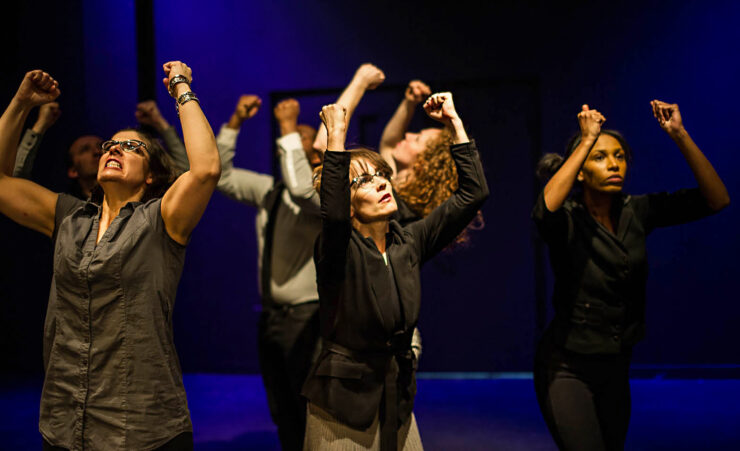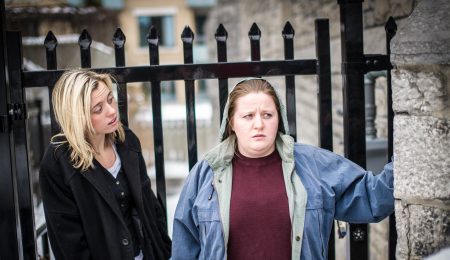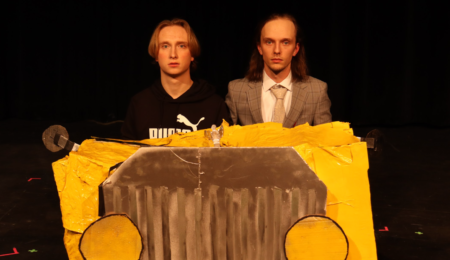U of O alumna behind verbatim dance piece encourages dialogue on sexual assault
On Friday, Jan. 20, as anti-Trump feminists were gearing up to march in Ottawa and around the world, the Gladstone Theatre put on a show that channeled this growing energy of discontent.
The Ghomeshi Effect is a verbatim dance-theatre production that gives a voice to survivors of sexual assault and shines a critical light on how the issue is handled by the Canadian justice system.
The play was created and directed by University of Ottawa alumna Jessica Ruano, who has a master of arts in theatre theory and dramaturgy, and is currently volunteering as a support worker for the Sexual Assault Support Centre (SASC).
Ruano explained that she came up with the idea for the play from watching other works of art dedicated to promoting a similar message.
“I saw that there was an initiative for arts projects and sexual violence … and I also went to go see Amelia’s play, Feelers,” she said, referring to Amelia Griffin, the choreographer of The Ghomeshi Effect. “I was very inspired by her work and the fact that she was very passionate about these issues.”
But Ruano affirmed that the push to produce really came from the trial of Jian Ghomeshi.
“I was intrigued by the whole thing, but … the trial really inspired a variety of reactions from people … and I learned a lot about how the legal system works from this trial and I wanted to learn more.”
The term “the Ghomeshi effect” has been used by a variety of media publications—the National Post, the Vancouver Sun, and more—to describe the backlash spurred by the trial of former CBC broadcast personality Jian Ghomeshi, who was acquitted of sexual harassment and assault in March 2016.
Although the production is inspired by these events, The Ghomeshi Effect is not a play about the trial or its outcome. Rather, in the spirit of continuing the conversations on rape culture, the production aims to give a voice to sexual assault survivors.
As such, the script was built entirely from transcripts of interviews conducted with sexual assault survivors and the lawyers involved in their cases.
Part of Ruano’s inspiration for this unique act also came from DV8 Physical Theatre, a dance company based in England.
“(DV8 does) verbatim dance theatre, as we’re doing here on controversial subjects,” she explained, adding that she saw all of their recent shows. “They do it all with interviews of people, so it’s very interesting, and very real life stuff. ”
Throughout the Jan. 20 performance, the actors embodied these individuals, sharing their stories and perspectives in both a raw and unedited manner, which was woven together masterfully through dance and sound.
The dance itself was intriguing and powerful to watch.
Griffin explains that adapting the dance to verbatim was a process reflected in a larger social need that extends outside of the walls of the theatre.
“We brought movement from the streets, movement from the people, not only from the cast but from the community at large.”
Some of these movements were discovered when the cast performed at the ChinaTown Remixed festival in late September, and asked people at the event what kind of movements they associated with words such as “protect” or “communicate.”
Sadly, such initiatives garnered a great deal of criticism from, in Ruano’s words, “victim blamers” and “rape culture deniers,” particularly through Twitter.
Among the tweets directed at the group were: “Is the #ghomeshieffect about scorned mentally ill woman falsely claiming abuse?” and “WE can make a play and smear her sons name after he’s proven innocent! @ONArtsCouncil will even pay us!!”
But Ruano and her team took that negative energy and turned it into a fundraising event last September, inspired by Jimmy Kimmel’s late night segment “Celebrities Read Mean Tweets,” where they read the Tweets aloud.
But there was more to this production than a simple night out at the theatre.
The Ghomeshi Effect is also part of a grassroots initiative by Perspective Collective Theatre that looks to bring local social organizations together to discuss ways to end gender-based violence and discrimination.
The night began with a keynote address from Glen Canning, father of Rehtaeh Parsons, who spoke about how mixed messages about how society defines rape culture affected Rehtaeh’s case.
Following the Jan. 20 performance, there was also a “talk-back” session where actors and organizations from MANifest Change and the Ottawa Coalition To End Violence Against Women engaged with the audience.
While Ruano believes in the merit of educating the masses about sexual assault, she asserts that “a survivor is the best judge of their own experience.”
The Ghomeshi Effect is playing at the Gladstone Theatre until Jan. 28. To purchase tickets, visit the Gladstone Theatre’s official website.




